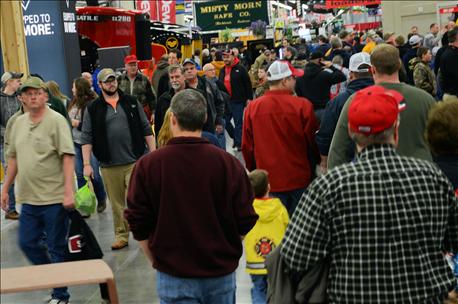February 11, 2016

Many readers of this column – perhaps all seven – know that a highlight of this job is the fact that I get to go to farm shows. And this week I’m at the grand-daddy of U.S. indoor shows – the National Farm Machinery Show in Louisville, Ky. If you haven’t been it’s worth adding to the ol’ bucket list.
It’s difficult to gauge the mood of a people at a time like this, but with the crowds moving through the exhibit halls it’s clear that even with cheap crops and a collapsing livestock market perhaps a good getaway from all that is to head to a farm show.

They're packing into the National Farm Machinery Show this week - and this was the typical look of many of the aisles.
One nice thing about this is that while current machinery sales are soft, everyone at this show probably feels like he or she will eventually have the cash again to invest in these tools; and they want to keep up. And of course, the show is full of items that can make your older machines more efficient perhaps through a minor upgrade – and this is the place to look.
I’ve also been “covered up” with press meetings for companies with new things to talk about. Case IH officially rolled out its new 2000 Series Early Riser Planter, Great Plains has the new AccuShot precision fertilizer application system, Agco’s Fendt officially launched the 1000 Series tractor in the U.S. (and yes more coverage to follow as I get through my notes).
Max Armstrong asked me if in times like these companies slow down their work on new tools and launches. My feeling is that a engineering and design department is like a freight train moving down a long development track. If the track ahead gets bumpy, the train may slow down a little, but it keeps moving forward. That’s what happens now, we’re finding new products at this show and new innovations. When you’re ready to invest again you’re going to find some neat tools.
Which brings me back to why there’s a crowd here – and I don’t think it was just because a lot of schools were closed and people had nothing else to do (though that couldn’t hurt) – it’s because you have to keep up. You have to maintain some knowledge about the changes and improvements in the tools you’ll be using in the future. It’s always important to try to keep up in your own industry.
Farm shows remain the most efficient way to do that – it’s like a one-day, super intense seminar with a lot of homework (those brochures you pick up). And worth your while.
Oh and full disclosure, we do own a few shows ourselves – Farm Progress Show, New York Farm Show, Husker Harvest Days and Hay and Forage Expo. But I attend a lot more than that, and every one of them has farmers working to do the same thing – see what’s new, get better at what they do on the farm.
Perhaps that’s why I like going to shows. Enjoy any shows you get to this winter, and see you at the fall shows!
About the Author(s)
You May Also Like






